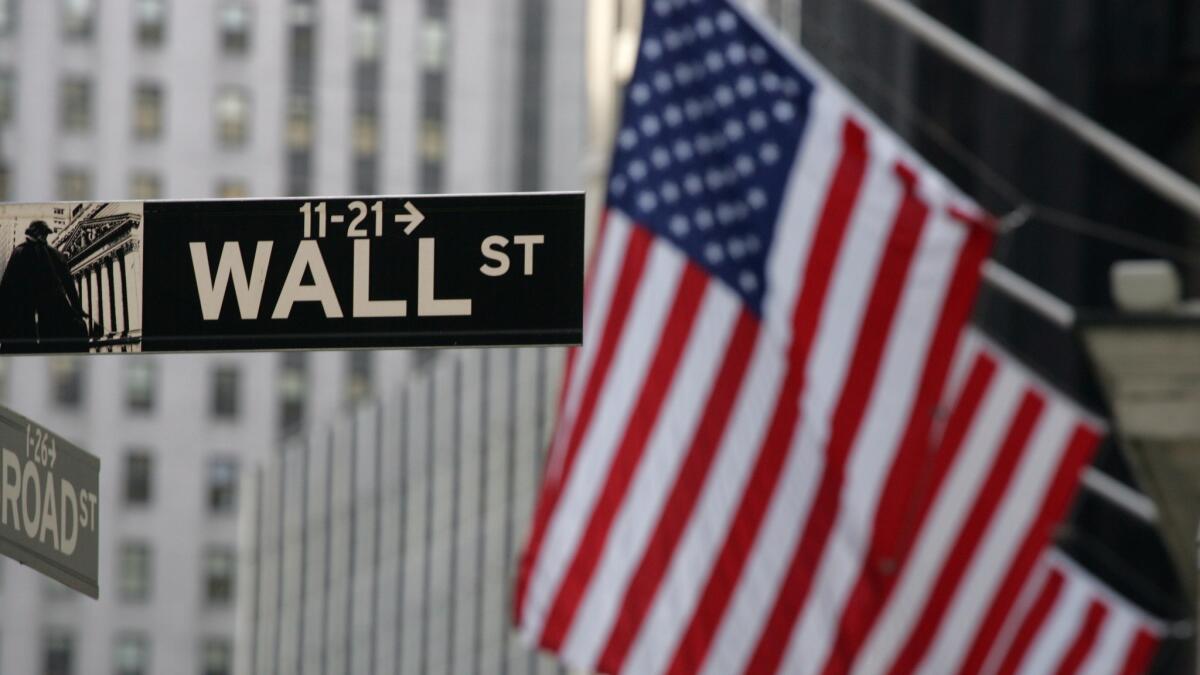Stocks that jumped after Trump’s election take a hit Monday

- Share via
U.S. stocks fell Monday as investors grew nervous after President Trump issued an order banning entry to the U.S. from seven Muslim-majority countries. Energy companies, which have surged over the last year, took the biggest losses.
Airlines skidded after Trump’s executive order led to protests and disruption at airports and concerns about travel. Big-name technology companies sagged on concerns that future administration moves will make it harder for them to hire workers.
Investors took profits, selling shares of basic materials and industrial companies, which had rallied after the November election. The VIX, a measure of Wall Street volatility, jumped, though it remains relatively low overall. Stocks in Europe lost ground as well.
Sameer Samana, a strategist for Wells Fargo Investment Institute, said investors are not overly alarmed by the news of the travel ban, but aren’t sure what to make of it, either.
“It’s very difficult to figure out exactly what implications it has for the economy and for markets,” he said.
The Dow Jones industrial average fell 122.65 points, or 0.6%, to 19,971.13. It was down as much as 223 points in the morning. The Standard & Poor’s 500 index fell 13.79 points, or 0.6%, to 2,280.90.
The Nasdaq composite dropped 47.07 points, or 0.8%, to 5,613.71 after it closed at an all-time high Friday. Small-company stocks were hit harder. The Russell 2000 index sank 18.37 points, or 1.3%, to 1,352.33.
Late Friday, Trump suspended the U.S. refugee program for 120 days and blocked travel to the United States by citizens of seven countries. His order is being challenged in court. Some airports became hosting grounds for protests, and investors wondered if American tourism will be affected. American Airlines slid 4.4% to $44.90 and United Continental fell 3.6% to $71.72.
Domestic airlines also struggled, and so did other companies that don’t necessarily have much at stake in disputes over immigration policy or global trade.
Samana said there’s no specific reason that the recent moves would hurt bank profits or small domestically focused companies, for example, and they may not cause long-term trouble for airlines. Instead, the stocks that did the worst Monday are largely the ones that have done the best since the election, including energy companies, banks and smaller companies.
Construction and mining company Caterpillar fell 2.2% to $96.79 and construction and technical services company Jacobs Engineering slipped 1.6% to $59.38. Construction materials company Vulcan skidded 2.7% to $130.73 and chemicals maker DuPont dropped 2.2% to $76.
The day’s largest losses went to energy companies, which have surged over the last year as the price of oil recovered from a deep drop. Chevron retreated 1.7% to $111.82 and ConocoPhillips slumped 3.9% to $47.48.
U.S. crude oil slid 54 cents, or 1%, to $52.63 a barrel in New York. Brent crude, the benchmark for international oil prices, fell 29 cents to $55.23 a barrel in London.
Rite Aid plunged 17.5% to $5.72 after Walgreens said it will cut the price it’s paying to buy its rival to no more than $7 per share from $9. That came after the companies said they will sell more of Rite Aid’s stores to get antitrust regulators to approve the deal. Walgreens said it may have to sell up to 1,200 Rite Aid stores, about a quarter of the company’s total. Walgreens shares edged down 2 cents to $81.48.
Mattress maker Tempur Sealy dived 28% to $45.49 and hit a three-year low after it said retailer Mattress Firm is moving to terminate its supply contracts with the company. Tempur Sealy said Mattress Firm wanted to make big changes to supply agreements and the two sides weren’t able to reach a compromise. It expects the two companies to stop doing business during the first quarter. Tempur Sealy said it made 21% of its net sales last year to Mattress Firm.
Fitness tracker maker Fitbit dropped 16% to $6.06 after the company posted weak fourth-quarter sales and said it will eliminate about 6% of its jobs, or about 110 positions.
Read more: Fitbit shares dive 16% after holiday sales disappoint; layoffs coming »
Bond prices slipped. The yield on the 10-year Treasury note rose to 2.49% from 2.48%.
The dollar fell to 113.67 yen from 115.09 yen. The euro slipped to $1.0695 from $1.0698.
In other energy trading, natural gas futures fell 13 cents, or 3.8%, to $3.23 per 1,000 cubic feet. Wholesale gasoline fell 2 cents to $1.51 a gallon. Heating oil fell 1 cent to $1.61 a gallon.
The price of gold rose $4.80 to $1,193.20 an ounce. Silver rose 2 cents to $17.15 an ounce. Copper fell 3 cents, or 1.3%, to $2.66 a pound.
The DAX of Germany and the French CAC-40 each fell 1.1% while Britain’s FTSE 100 was down 0.9%. Japan’s Nikkei 225 fell 0.5%. Other major indexes in Asia were closed for the Chinese New Year.
ALSO:
Measuring Trump’s role in U.S. jobs announcements
Fingerprint checks and iris scans are coming to LAX — but you have to pay for them
Tech industry reacts to Trump’s executive order on immigration with fear and frustration
UPDATES:
3:50 p.m.: This article was updated with closing prices, context and analyst comment.
10:25 a.m.: This article was updated with more recent market prices, context and analyst comment.
7:50 a.m.: This article was updated with market prices and context.
This article was originally published at 7 a.m.
More to Read
Inside the business of entertainment
The Wide Shot brings you news, analysis and insights on everything from streaming wars to production — and what it all means for the future.
You may occasionally receive promotional content from the Los Angeles Times.










